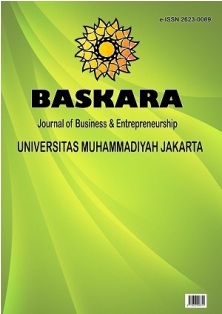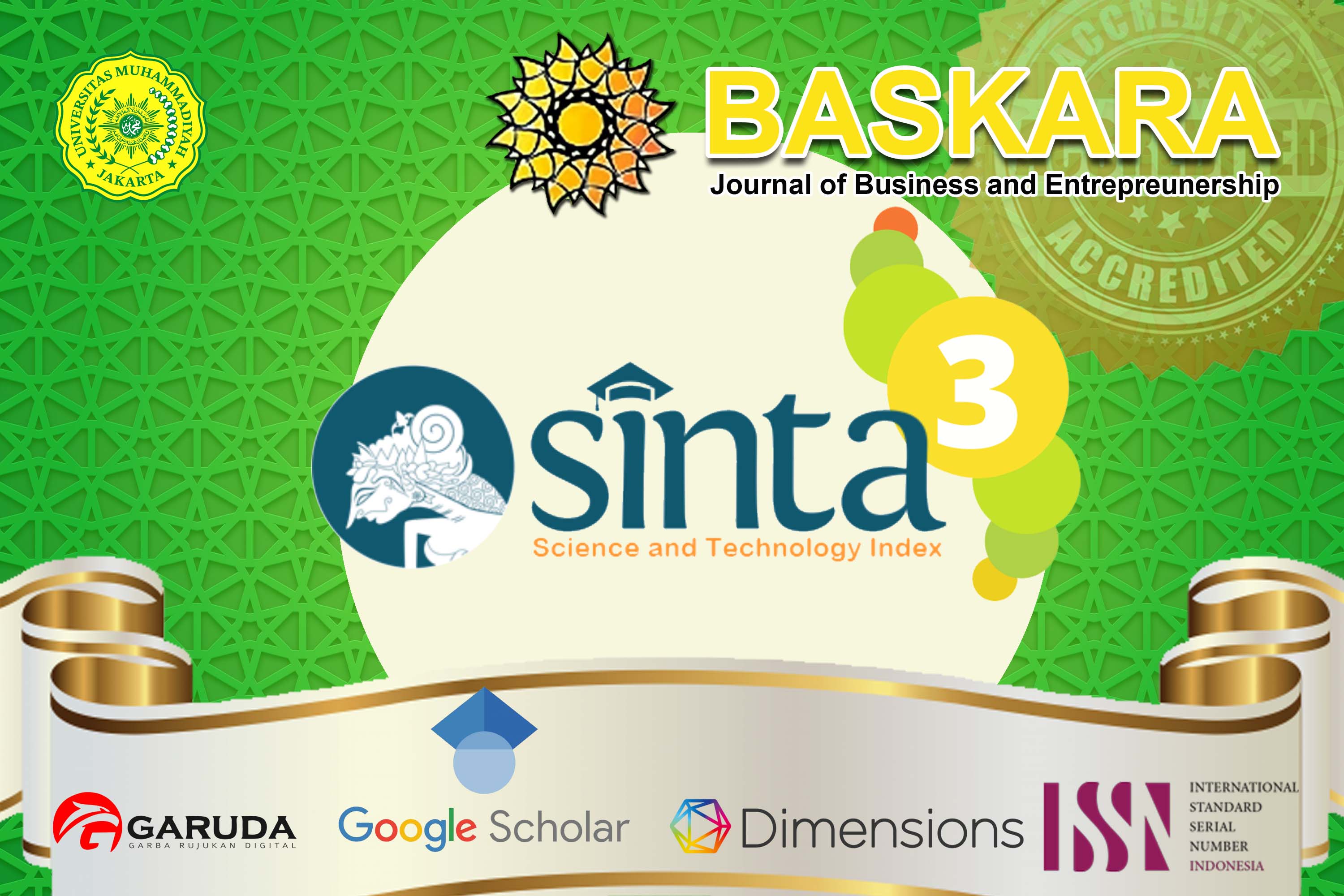Pendekatan Budaya Lokal: Meningkatkan Perekonomian dan Tatanan Sosial Masyarakat Perbatasan (Dalam Perspektif Ekonomi Islam)
DOI:
https://doi.org/10.54268/baskara.v2i1.6189Kata Kunci:
Budaya Lokal, Perekonomian, Tatanan Sosial, PerbatasanAbstrak
Artikel ini membahas tentang pendekatan budaya lokal: meningkatkan perekonomian dan tatanan sosial masyarakat perbatasan. Penelitian ini memfokuskan pada bagaimana pendekatan budaya yang ada ditengah-tengah masyarakat berperan dalam praktek perdagangan pada masyarakat perbatasan. Meskipun budaya-budaya local tersebut sangat rentan akibat pengaruh globalisasi dan teknologi. Adapun pemilihan lokasi penelitian ini dilakukan pada masyarakat perbatasan Temajuk Kabupaten Sambas. Pendekatan yang digunakan dalam penelitian ini adalah pendekatan kualitatif. Hasil penelitian ini menunjukan bahwa praktek perdagangan yang dilakukan oleh masyarakat Muslim di Desa Temajuk Kabupaten Sambas sangat mengedepankan nilai Islam yakni nilai falah. Semantara itu, nilai falah dalam praktek perdagangan masyarakat perbatasan Desa Temajuk Kabupaten Sambas lebih dikenal budaya belalle’, talangge’, sikutuan, dan taware’.Referensi
A.Michael Huberman, Matthew B. Miles 1994. Qualitative Data Analysis: A Source Book of New Methodes, C.A.Sage. Newbury Park.
Anita Rahmawaty, Distribusi Dalam Ekonomi Islam Upaya Pemerataan Kesejahteraan Melalui Keadilan Distributif, Jurnal Equilibiriu, STAIN Kudus, Volume 1, No.1, Juni 2013.
Bagong Suyanto. (2013). Sosiologi Ekonomi, Kapitalisme dan Konsumsi di era Masyarakat Post-Modernisme, Jakarta: Kencana, Prenada Media Group.
Brayn Turner. (2012). Teori Sosial; Dari Klasik Sampai Post Modernisme, Jogjakarta:Pustaka Pelajar.
Damsar. (1997). Sosiologi Ekonomi, Jakarta: Rajawali Press.
Euis Amalia. Potensi dan Persoalan LKMS/BMT bagi Penguatan UKM dalam Kerangka Keadilan Distributif Ekonomi Islam: Studi LKMS/BMT di 6 Kota Pulau Jawa”, Makalah disajikan dalam International Seminar and Symposium on Implementations of Islamic Economics to Positive Economics in the World, Universitas Airlangga, Surabaya, 1- 3 Agustus 2008.)
Ilfi Nur Diana. (2008). Hadis-hadis Ekonomi, (Malang: UIN Malang Press.
KJ. Veeger. (1985). Realitas Sosial: Refleksi Filsafat Sosial Atas Hbungan Individu-Masyarakat dalam Cakrawala Sejarah Sosiologi, Jakarta: Gramedia.
Muhammad Fu‟ad Abdul Baqi, Al-Mu‟jam Al-mufarras lil al-fadz al-qur‟an al-karim, (Bairut: Daarul Fikr, 1407 H).
Mustafa Edwin Nasution dkk. (2010). Pengenalan Ekslusif Ekonomi Islam. (Jakarta Kencana.
Nurchalis Madjid. (1991). Agama dan Negara dalam Islam: Sebuah Telaah atas Fiqh Siyasi Sunni, (Jakarta: Yayasan Paramadina.
Rudiatin, E., & Ramadhan, A. I. (2018). Kekuatan Moral Dan Budaya, Mendukung Perekonomian Indonesia: Sebuah Gambaran Usaha Kecil Dan Menengah. BASKARA Journal of Business & Entrepreneurship, 1(1), 21-34.
Sadono Sukirno. (2006). Mikro Ekonomi Teori Pengantar, Jakarta: PT. Rajagrafindo.
Yusuf Qardhawi. (1997). Pesan Nilai dan Moral dalam Perekonomian Islam, Jakarta: Robbani Press.
##submission.downloads##
Diterbitkan
Terbitan
Bagian
Lisensi
In order for Baskara: Journal of Business and Entrepreneurship to publish and disseminate research articles, we need publishing rights (transfered from author(s) to publisher). This is determined by a publishing agreement between the Author(s) and Baskara Journal. This agreement deals with the transfer or license of the copyright of publishing to Baskara: Journal of Business and Entrepreneurship, while Authors still retain significant rights to use and share their own published articles. Baskara : Journal of Business and Entrepreneurship supports the need for authors to share, disseminate and maximize the impact of their research and these rights, in any databases.
As a journal Author, you have rights for a large range of uses of your article, including use by your employing institute or company. These Author rights can be exercised without the need to obtain specific permission. Authors publishing in Baskara : Journal of Business and Entrepreneurship have wide rights to use their works for teaching and scholarly purposes without needing to seek permission, including:
- use for classroom teaching by Author or Author's institution and presentation at a meeting or conference and distributing copies to attendees;
- use for internal training by author's company;
- distribution to colleagues for their reseearch use;
- use in a subsequent compilation of the author's works;
- inclusion in a thesis or dissertation;
- reuse of portions or extracts from the article in other works (with full acknowledgement of final article);
- preparation of derivative works (other than commercial purposes) (with full acknowledgement of final article);
- voluntary posting on open web sites operated by author or author’s institution for scholarly purposes.
Copyright Transfer Agreement for Publishing (Publishing Right)
The Authors who submit manuscript has to understand that if accepted for publication, mean that all copyright and publishing right of the article shall be assigned/transferred to Baskara: Journal of Business and Entrepreneurship as assigned publisher.
- CC BY-NC: This license allows reusers to distribute, remix, adapt, and build upon the material in any medium or format for noncommercial purposes only, and only so long as attribution is given to the creator.
It includes the following elements:
BY ![]() – Credit must be given to the creator
– Credit must be given to the creator
NC ![]() – Only noncommercial uses of the work are permitted
– Only noncommercial uses of the work are permitted
Baskara (C) Copyright (2022):
BASKARA: Journal of Business and Entrepreneurship by https://jurnal.umj.ac.id/index.php/baskara
is licensed under a Creative Commons Attribution-NonCommercial 4.0 International License








